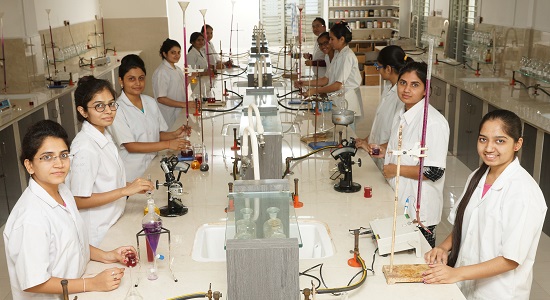 ccsitjunagadh@gmail.com
ccsitjunagadh@gmail.com Green City, Bypass Road, Near Chobari Railway Crossing, Junagadh
Green City, Bypass Road, Near Chobari Railway Crossing, Junagadh

Chemistry has emerged as the significant subject for industrial application as well as educational aspects. It incorporates number of sub-disciplines including solid state chemistry and inorganic materials, coordination chemistry, analytical chemistry, bio-inorganic chemistry, bio-organic chemistry, organometallic chemistry, synthetic organic chemistry, carbohydrate chemistry, photochemistry, polymer science, homogeneous and heterogeneous catalysis, green chemistry, nano chemistry, nuclear chemistry, quantum chemistry, molecular and magnetic resonance spectroscopy.
The M.Sc. syllabus provides an integrated and unified approach towards chemical sciences. The program is demanding in according to national and international standards and covers theory and practical courses with full emphasis to construct intellectual assets. The academic study at each level is balanced with a number of other related activities, which include co-curricular activities. Special lectures on varied topic of academic relevance are held. Two year post graduation in chemistry enables the candidates to fetch wide variety of career opportunities available in the field of chemistry.
| CC-101 | Inorganic Chemistry |
| CC-102 | Organic Chemistry |
| CC-103 | Physical Chemistry |
| CC-104 | Analytical Chemistry |
| CC-105 | Practical |
| CC-106 | Practical Viva Voce |
| CC-107 | Chemoinformatic Tools |
| CC-201 | Inorganic Chemistry |
| CC-202 | Organic Chemistry |
| CC-203 | Physical Chemistry |
| CC-204 | Analytical Chemistry |
| CP-205 | Practical |
| CP-206 | Practical Viva Voce |
| CP-207 | Research Writing |
| OC-301 | Stereochemistry and Asymmetric Synthesis |
| OC-302 | Heterocyclic Chemistry and Pericyclic Reactions | OC-303 | Medicinal Chemistry | OC-304 | Modern Spectroscopy | OP-305 | Practical & Viva Voce | OP-306 | Research Proposal & Viva Voce Presentation |
| OC-401 | Organic Synthesis: A Disconnection Approach |
| OC-402 | Separation Techniques |
| OP-403 | Dissertation or Practical |
| OP-404 | Dissertation/ Practical Viva Voce |
Candidates who have passed B.Sc. Chemistry subjects with minimum 48% from any recognized university are eligible to apply.
Candidate must have Chemistry subject in 3rd and 4th semester, if they have completed bachelor’s in subjects other than Chemistrybiology.
There is a huge scope in the field of Chemistry. One can do job or can go for higher studies after the completion of course.
M.Sc.(Chemistry.) student can work as a...



